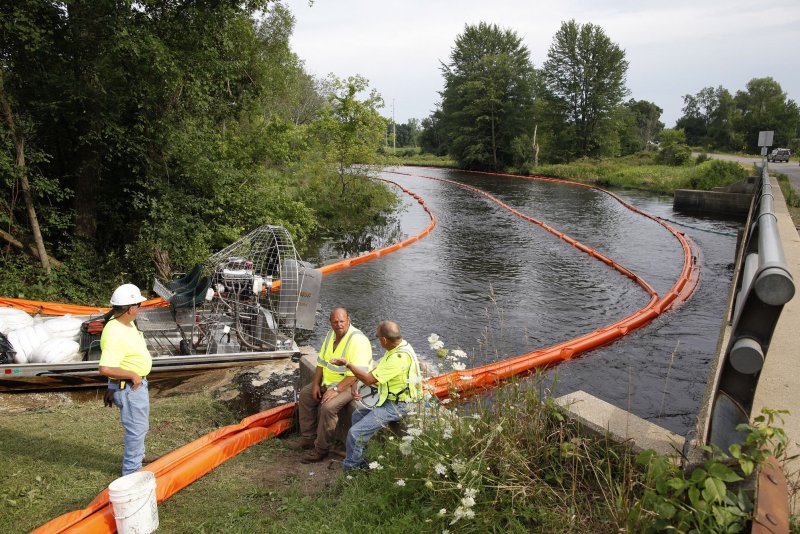Environmental groups sound alarm after Canadian pipeline company Enbridge reaches settlement with federal government over a 2010 spill that soiled waterways in southern Michigan. File Photo by Brian Kersey/UPI |
License Photo
LANSING, Mich., July 21 (UPI) -- A $177 million settlement for oil spills in 2010 in the Great Lakes states serves as a warning of the dangers of shipping heavy oils, environmental groups said.
Canadian oil transit company Enbridge reached the multi-million dollar settlement with the U.S. Justice Department and Environmental Protection Agency for charges stemming from releases tied to the 2010 rupture of Line 6b of a broader Great Lakes pipeline system.
"Communities being asked to allow tar sands pipelines through their borders, or tankers along their shores, need to understand the industry knows very little about how to address these spills," Anthony Swift, director for Canadian projects at the Natural Resources Defense Council, said in a emailed statement.
Line 6b was carrying oil sands from Canadian operations at the time of the incident. That type of oil is heavier than water, causing it to sink and mix with river sediment.
Enbridge Energy and the state of Michigan filed a settlement in a county court last year that required the company to monitor the environmental impacts of the spill and spend up to $75 million in restoration and remediation work in area waterways.
Enbridge has faced continued scrutiny about its safety record in the region. A "pinhole" leak was discovered in late 2014 on an Enbridge pipeline in Michigan's Upper Peninsula, though no spill was associated with the incident.
Environmental groups said a federal Canadian report found Enbridge had been using defective parts on its pipelines "for years." Meanwhile, the groups said the company has been operating its Alberta Clipper pipeline at a higher volume with a proper vetting.
"No amount of crude oil being transported near our communities or the Great Lakes is safe," Lena Moffitt with the Sierra Club said.
The 2010 rupture led to one of the worst onshore spills in the history of the industry. Enbridge President and CEO Al Monaco said the six-year process led to inevitable changes on the company's posture on pipeline safety.
"Over the past six years, we've intensified our focus on the safety and integrity of our systems enterprise-wide and we've invested significantly in our people, processes, equipment and technology," he said.















